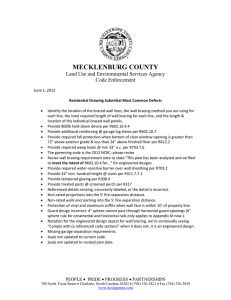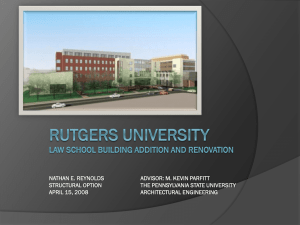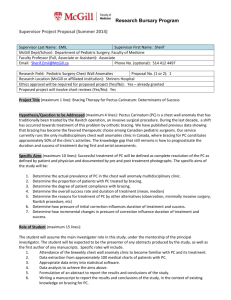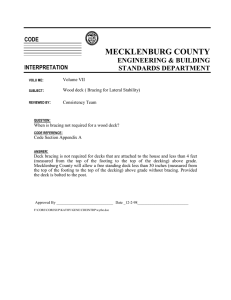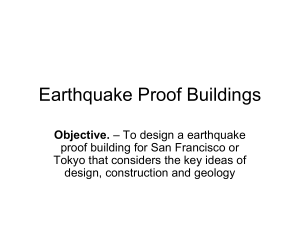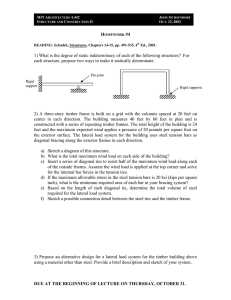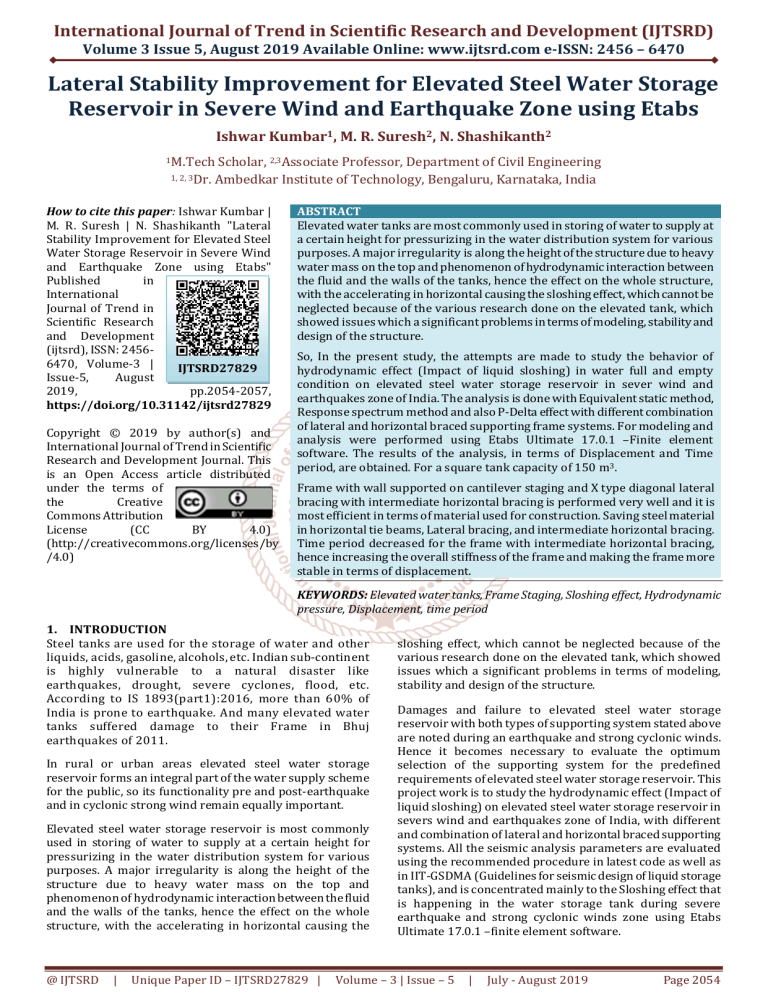
International Journal of Trend in Scientific Research and Development (IJTSRD)
Volume 3 Issue 5, August 2019 Available Online: www.ijtsrd.com e-ISSN: 2456 – 6470
Lateral Stability Improvement for Elevated Steel Water Storage
Reservoir in Severe Wind and Earthquake Zone using Etabs
Ishwar Kumbar1, M. R. Suresh2, N. Shashikanth2
1M.Tech
Scholar, 2,3Associate Professor, Department of Civil Engineering
1, 2, 3Dr. Ambedkar Institute of Technology, Bengaluru, Karnataka, India
How to cite this paper: Ishwar Kumbar |
M. R. Suresh | N. Shashikanth "Lateral
Stability Improvement for Elevated Steel
Water Storage Reservoir in Severe Wind
and Earthquake Zone using Etabs"
Published
in
International
Journal of Trend in
Scientific Research
and Development
(ijtsrd), ISSN: 24566470, Volume-3 |
IJTSRD27829
Issue-5,
August
2019,
pp.2054-2057,
https://doi.org/10.31142/ijtsrd27829
Copyright © 2019 by author(s) and
International Journal of Trend in Scientific
Research and Development Journal. This
is an Open Access article distributed
under the terms of
the
Creative
Commons Attribution
License
(CC
BY
4.0)
(http://creativecommons.org/licenses/by
/4.0)
ABSTRACT
Elevated water tanks are most commonly used in storing of water to supply at
a certain height for pressurizing in the water distribution system for various
purposes. A major irregularity is along the height of the structure due to heavy
water mass on the top and phenomenon of hydrodynamic interaction between
the fluid and the walls of the tanks, hence the effect on the whole structure,
with the accelerating in horizontal causing the sloshing effect, which cannot be
neglected because of the various research done on the elevated tank, which
showed issues which a significant problems in terms of modeling, stability and
design of the structure.
So, In the present study, the attempts are made to study the behavior of
hydrodynamic effect (Impact of liquid sloshing) in water full and empty
condition on elevated steel water storage reservoir in sever wind and
earthquakes zone of India. The analysis is done with Equivalent static method,
Response spectrum method and also P-Delta effect with different combination
of lateral and horizontal braced supporting frame systems. For modeling and
analysis were performed using Etabs Ultimate 17.0.1 –Finite element
software. The results of the analysis, in terms of Displacement and Time
period, are obtained. For a square tank capacity of 150 m3.
Frame with wall supported on cantilever staging and X type diagonal lateral
bracing with intermediate horizontal bracing is performed very well and it is
most efficient in terms of material used for construction. Saving steel material
in horizontal tie beams, Lateral bracing, and intermediate horizontal bracing.
Time period decreased for the frame with intermediate horizontal bracing,
hence increasing the overall stiffness of the frame and making the frame more
stable in terms of displacement.
KEYWORDS: Elevated water tanks, Frame Staging, Sloshing effect, Hydrodynamic
pressure, Displacement, time period
1. INTRODUCTION
Steel tanks are used for the storage of water and other
liquids, acids, gasoline, alcohols, etc. Indian sub-continent
is highly vulnerable to a natural disaster like
earthquakes, drought, severe cyclones, flood, etc.
According to IS 1893(part1):2016, more than 60% of
India is prone to earthquake. And many elevated water
tanks suffered damage to their Frame in Bhuj
earthquakes of 2011.
In rural or urban areas elevated steel water storage
reservoir forms an integral part of the water supply scheme
for the public, so its functionality pre and post-earthquake
and in cyclonic strong wind remain equally important.
Elevated steel water storage reservoir is most commonly
used in storing of water to supply at a certain height for
pressurizing in the water distribution system for various
purposes. A major irregularity is along the height of the
structure due to heavy water mass on the top and
phenomenon of hydrodynamic interaction between the fluid
and the walls of the tanks, hence the effect on the whole
structure, with the accelerating in horizontal causing the
@ IJTSRD
|
Unique Paper ID – IJTSRD27829 |
sloshing effect, which cannot be neglected because of the
various research done on the elevated tank, which showed
issues which a significant problems in terms of modeling,
stability and design of the structure.
Damages and failure to elevated steel water storage
reservoir with both types of supporting system stated above
are noted during an earthquake and strong cyclonic winds.
Hence it becomes necessary to evaluate the optimum
selection of the supporting system for the predefined
requirements of elevated steel water storage reservoir. This
project work is to study the hydrodynamic effect (Impact of
liquid sloshing) on elevated steel water storage reservoir in
severs wind and earthquakes zone of India, with different
and combination of lateral and horizontal braced supporting
systems. All the seismic analysis parameters are evaluated
using the recommended procedure in latest code as well as
in IIT-GSDMA (Guidelines for seismic design of liquid storage
tanks), and is concentrated mainly to the Sloshing effect that
is happening in the water storage tank during severe
earthquake and strong cyclonic winds zone using Etabs
Ultimate 17.0.1 –finite element software.
Volume – 3 | Issue – 5
|
July - August 2019
Page 2054
International Journal of Trend in Scientific Research and Development (IJTSRD) @ www.ijtsrd.com eISSN: 2456-6470
2. LITERATURE REVIEW
R V Raikar, Keerti M. Telsang, Kiran M. Malipatil,
KLEMSSCET Belgavi :In this paper seismic analysis by
Response spectrum method is carried out, with and without
the bracing configuration.in considering different
earthquakes zones (zone 2 to 5) and soil conditions. The
analysis is carried out using STAAD-PRO V8i software.
The result for bare and braced frame tanks, which in terms
of the time period, base shear and displacement for different
seismic zones and soil condition are compared.
The results obtained are:
1. The 3&4th story of water tank showed better
performance of the 2 storey in terms of displacement.
2. An increase overall stiffens is increased in the braced
frame the unbraced one.
R. Livaoğlu1 and A. Doğangün:This paper specifically deals
with the response of supporting Frame system of water
tower he has considered cylindrical supporting and frame
supporting system. The seismic analysis was performed
considering fluid-structure interaction.
In the study displacement base lagrangian approach is
selected model the fluid elevated tank interaction study.
Three transitional degrees of freedom at each eight nodes is
taken.
By the analysis carried out, Author calculated the peak
response and corresponding time period where the
maximum roof displacement, sloshing displacement, base
moment &base shear.
The results obtained are:
1. Result found that at 9 &10 second maximum response
are obtained for fame support & for cylindrical support
at 5 &10 sec.
2. For frame support roof displacement are high.
3. Sloshing response is also affected so cannot be neglected
o seismic analysis.
4. Cylindrical shaft system may be used in the region
having seismic risk.
Anand H Shrigondekar and Rajesh D Padhye:The Basic
plot behind this paper is to analysis of concert elevated
water tank of 400m3.For a different type of horizontal
bracing arrangement at Frame. Analyzed by the linear
dynamic method and seismic response method .tank full,
partially, empty case.
Conclusions are:
1. Octagonal &radial bracing has higher base shear.
2. As the bracing level increase, storey displacement goes
on decreases.
3. Less storey displacement has seen in octagonal and
radial bracing.
4. As the level of bracing increase maximum Bending
moment at bottom of Colum decreases.
5. Higher Base shear, Max BM &storey displacement seen
in full as compared to half and empty tank.
Kulvendra Patel:In this paper involve the analysis of the
entire water structure in different wind and earthquake zone
by STAADPRO by Response spectrum method provide
displacement, bending moment, Axil force, torsion.
The results obtained are:
1. The shape of the model becomes complicated due to
higher modes. And modal frequency increase and
@ IJTSRD
|
Unique Paper ID – IJTSRD27829 |
requires more energy to excite these modes than the
simples low-frequency modes.
More than 90% of the total seismic weight obtained for
different modal in a different direction.
2.
3. OBJECTIVES OF THE STUDY
The objectives of the study are:
1. And the main objective of this project work is to study
the hydrodynamic effect (Impact of liquid sloshing) on
elevated steel water storage reservoir in sever wind and
earthquakes zone of India, with different and
combination of lateral, intermediate horizontal braced
supporting frame.
2. And study the empty and full reservoir in severs wind
and earthquakes zone of India, with different and
combination of lateral, intermediate horizontal braced
supporting frame.
3. And to compare the results obtained from the analysis in
terms of displacement and time period with different
and combination of lateral, intermediate horizontal
braced supporting frame.
4. And to compare the results obtained from the analysis in
terms of displacement and time period of the frame with
wall supported on cantilever staging and X type diagonal
lateral bracing with intermediate horizontal bracing.
5. Suggesting the improved lateral stability braced
supporting frame for elevated steel water storage
reservoir in sever wind and earthquakes zones of India.
4. MODEL DESCRIPTION AND ANALYSIS
A Steel water reservoir container of 1,50,000 liter
(150m3)
Height 2m + 0.2 m as freeboard
Square shape
Total height up to staging 18m
Number of storey 6
Provide the two bay of 4.5c/c and Total 10 columns
4.1 Frames
In the present study total, seven Frames are modeled with
full and empty tank using of Etabs Ultimate 17.0.1.
1. Frame without lateral bracing and with intermediate
horizontal bracing.
2. Frame with X type diagonal lateral bracing without
intermediate horizontal bracing.
3. Frame with X type diagonal lateral bracing and
intermediate horizontal bracing.
4. Frame with chevron type lateral bracing without
intermediate horizontal bracing.
5. Frame with chevron type lateral bracing and
intermediate horizontal bracing.
6. Frame with chevron eccentrical type lateral bracing and
intermediate horizontal bracing.
7. Frame with wall supported on cantilever staging and X
type diagonal lateral bracing with intermediate
horizontal bracing.
4.2
Earthquake parameters:
Table1
CONSTANT
Zone
Importance
ordinary moment resisting frame (OMRF)
special moment resisting frame(SMFR)
Soil type
Volume – 3 | Issue – 5
|
July - August 2019
VALUES
V
1.5
3.5
4
Medium
Page 2055
International Journal of Trend in Scientific Research and Development (IJTSRD) @ www.ijtsrd.com eISSN: 2456-6470
4.3
Wind parameters:
Table2
CONSTANT
Zone
Wind speed
Risk Coefficient (k1Factor)
Terrain Category (K2)
Topography (k3Factor)
Importance Factor for Cyclonic Region
(k4)
VALUES
V
50 m/s
1.5
1
1
1.3
Fig.3 TIME PERIOD v/s FRAMES FOR TANK EMPTY
CONDITION
5. Result obtained from the analysis
Frame without lateral bracing and with intermediate
horizontal bracing.
The displacement for full and empty condition is 2.3m and
1.2m The time period for full and empty condition is 0.01
and 1.6
FRAME1. Frame with X type diagonal lateral bracing without
intermediate horizontal bracing.
FRAME2. Frame with X type diagonal lateral bracing and
intermediate horizontal bracing.
FRAME3. Frame with chevron type lateral bracing without
intermediate horizontal bracing.
FRAME4. Frame with chevron type lateral bracing and
intermediate horizontal bracing.
FRAME5. Frame with chevron eccentrical type lateral
bracing and intermediate horizontal bracing.
FRAME6. Frame with wall supported on cantilever staging
and X type diagonal lateral bracing with intermediate
horizontal bracing.
Fig.4 TIME PERIOD v/s FRAMES FOR TANK FULL
CONDITION
6. Improved lateral stability
Frame with wall supported on cantilever staging and X
type diagonal lateral bracing with intermediate
horizontal bracing is performed very well and it is the
most efficient in terms of material used for construction.
Saving steel material in horizontal tie beams, Lateral
Bracing, and intermediate horizontal bracing.
The cantilever portions on either side behaved like
overhang and pushing the wall inside so controlling the
lateral sway of the frame.
Fig.1 DISPLCEMENTv/sFRAMES FOR TANK EMPTY
CONDITION
Fig.5 Overhang behavior on either side of staging
Fig.2 DISPLCEMENT v/s FRAMES FOR TANK FULL
CONDITION
@ IJTSRD
|
Unique Paper ID – IJTSRD27829 |
Volume – 3 | Issue – 5
|
July - August 2019
Page 2056
International Journal of Trend in Scientific Research and Development (IJTSRD) @ www.ijtsrd.com eISSN: 2456-6470
And also the introduction of intermediate horizontal
bracing can effectively reduce the displacements of the
frame.
Frame with chevron eccentrical type lateral bracing with
intermediate horizontal bracing did not perform well as
compared to the other braced frames
Time period decreased for the frame with intermediate
horizontal bracing, hence increasing the overall stiffness
of the frame and making the frame more stable in terms
of displacement.
Frame with wall supported on cantilever staging and X
type diagonal lateral bracing is performed very well and
it the most efficient in terms of material used for
construction. Saving steel material in horizontal tie
beams, Lateral Bracing, and intermediate horizontal
bracing.
ACKNOWLEDGMENT
I am extremely thankful and indebted to, almighty, my
family, friends, Dr. O R Jaiswal, Dr. M. R. Suresh for their
constanencouragement without which this project would not
be possible.
REFERENCES
[1] Georgee W. Housner, 1963 “The Dynamic Behaviours
of Water Tank” Bulletin of the Seismological Society of
America.
Fig.6 Normal simply supported staging
[2] Sudhir K.Jain AND M.S.Medhekar. “Proposed provision
for the aseismic design of liquid storage tanks: part II –
commentary and examples”
[3] R V Raikar, Keerti M. Telsang, Kiran M. Malipatil,
KLEMSSCET Belagavi Seismic Response of Cylindrical
Elevated Steel Water Tank.
[4] R. Livaoğlu1 and A. Doğangüin, “An investigation about
effectss of supporting systems on fluid-elevated tanks
interaction”
[5] Anand H Shrigondekar, Rajesh D Padhye, “Performance
of RC Elevated Water Tank for different Bracing
Patterns under the effect of Earthquake Excitation.”
[6] Gaurav S. Atalkar and Anand M.Gharad, “comparative
analysis of elevated water storage structure using
different types of bracing patterns in Frame.”
[7] Kulvendra Patel, “Wind and Seismic Analysis of
Elevated Tank using Staad Pro”.
[8] M.K. Shrimali, R.S. Jangid,“ Earthquakee response of
isolated elevated liquid storage steel tanks”.
Fig.7 Cantilever staging
7. CONCLUSIONS
The result shows that the bare frame is highly
unacceptable for framing of elevated steel water storage
reservoir in severe wind and earthquakes zones.
Result for the empty tank condition is low value when
compared to the tank full in terms of both displacement
and time period.
The displacement responses are changed by the
combination of lateral and horizontal braced supporting
frame system as expected. However, the change in the
displacement values are considerably affected the frame
system behavior.
@ IJTSRD
|
Unique Paper ID – IJTSRD27829 |
BIBLIOGRAPHY
[1] Punmia BC, Ashok Kumar Jain, Arun Kumar Jain.
“Design of Steel Structures”, 10th Edn, 2015.
[2] S K Duggal. “Design of Steel Structures”, 5th Edn, 2012.
[3] Annanad S.Arya, J.L.Ajmani.
Structures”. 5th Edn,2011
“Design
of
Steel
[4] Ramchandra, Vierndra Gehlot. ““Design of Steel
Structures -2”. 9th Edn,2011
[5] N Subramanian. “Steel Structures: Design and
Practice”.2011
Volume – 3 | Issue – 5
|
July - August 2019
Page 2057

